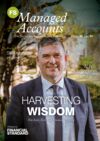ATO targets crypto investors, sharing economyBY KARREN VERGARA | WEDNESDAY, 17 APR 2024 12:34PMCryptocurrency and the sharing economy are two hotspots the Australian Taxation Office (ATO) will target this financial year as too many investors continue to blunder their tax returns. With a horde of investors jumping on the cryptocurrency bandwagon, many are failing to declare their profits and in some cases the losses, according to H&R Block director of tax communication Mark Chapman. The ATO estimates between 500,000 and one million Australians invest in cryptocurrency. Investors must remember that cryptocurrencies, like shares, can give rise to capital gains tax (CGT) on profits, he said, adding they can be taxed on their profits as business income. Cryptocurrencies include coins, tokens, and non-fungible tokens (NFT). Investors must declare staking rewards, which is income paid to crypto owners who hold tokens to validate transactions on the blockchain, and airdrops, which is the distribution of crypto-assets to digital wallets. They must also declare these values under the heading "Other income" in their tax return.
If an investor later sells the crypto-asset earned via staking or airdrops, the amount reported as income will be the cost base for calculating CGT. In a bid to search for elusive investors, Chapman said the ATO is collecting bulk records from Australian cryptocurrency designated service providers (DSPs) as part of a data matching program to ensure people trading in cryptocurrency are paying the right amount of tax. "Data provided to the ATO includes cryptocurrency purchase and sale information. The data will identify taxpayers who fail to disclose their income details correctly," he said. Those taking part in the sharing economy will also be high on the ATO's radar. Chapman said the tax office is convinced that many people in the sharing economy are not properly declaring their profits and gains. "So, if you obtain work through Uber, Airtasker or any of the many sharing economy platforms which allow you to rent out assets or your personal services, take heed. The ATO is now receiving reports from many platforms (including Uber), which it can use to highlight data mismatches," he said. Those who rent out properties or part of one via platforms like Airbnb and Stayz are also under the spotlight. "The ATO has numerous third-party sources of data which it can use to identify if you are receiving rent and they are on the lookout for mismatches with the tax return data that you report," he said. Similarly, property investors claiming deductions are never far from the ATO's watchful eye as a recent review found 90% of tax returns were full of errors. This year, Chapman said investors can expect the ATO to crack down on excessive interest expense claims, such as where property owners have tried to claim borrowing costs on the family home and rental property. Incorrect apportionment of rental income and expenses between owners, such as where deductions on a jointly owned property are claimed by the owner with the higher taxable income, rather than jointly - will be targeted - together with holiday homes that aren't genuinely available for rent. Incorrect claims for newly purchased rental properties is another focus area. "The costs to repair damage and defects existing at the time of purchase or the costs of renovation cannot be claimed immediately. These costs are deductible instead over a number of years," he said. Related News |
Editor's Choice
ASIC hits back at parliament: 'Simply not realistic'
|The risks and opportunities in advice: SIAA
|AMP Advice partners with BlackRock and Lonsec
|Succession planning troubles family offices: J.P. Morgan
| Sponsored by Sponsored by | Where do advisers invest their time?The stage 3 tax cuts have sparked discussions on bracket creep. Implementing a tax-effective investment strategy is crucial now more than ever. |
 Sponsored by Sponsored by | Quality and Yield. A Powerful combination.With central bank rates seemingly peaked, investors are not awaiting yield increases. We're bucking the trend with investment rates at decadal highs |
 Sponsored by Sponsored by | Why it could be a good time to be a growth contrarianGrowth-style companies are in vogue, but you may need to think outside the box to ensure you don't overpay. |
Products
Featured Profile

Fiona Mann
BRIGHTER SUPER




























